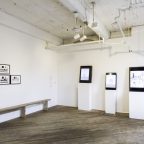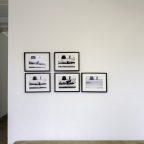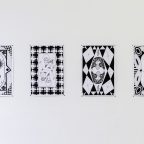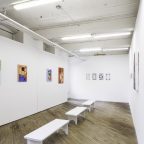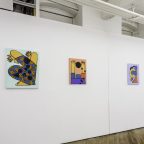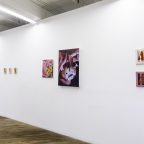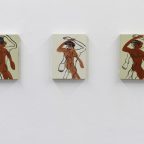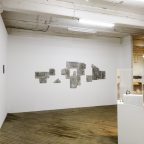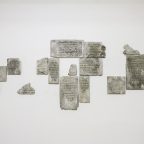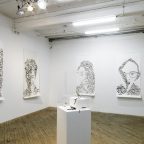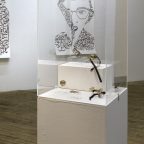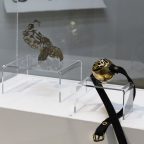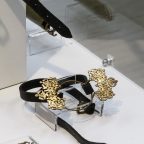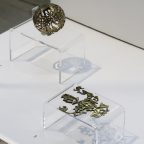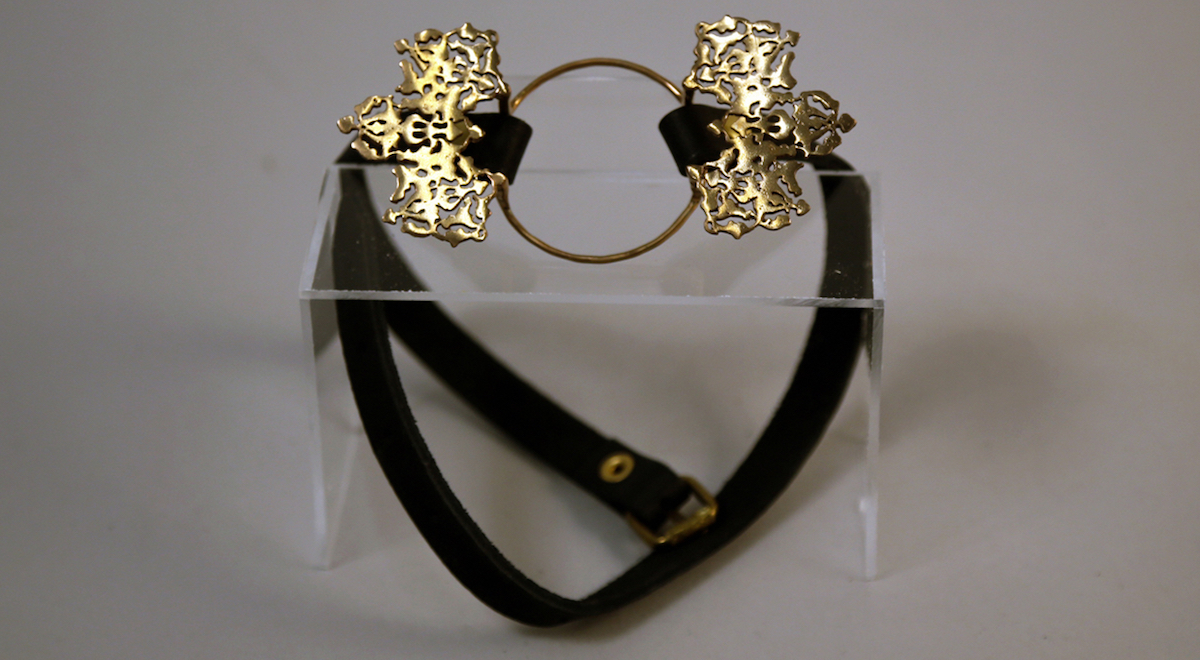
On identity, home, and diaspora: through the eyes of YallaPunk’s community
Curated by Rana Fayez
Friday, January 11, 2019 – Sunday, February 17, 2019
Curatorial Statement
Being a part of the diaspora is never quite feeling at home or maybe it’s constantly negotiating the concept of home. Whether it’s negotiating with yourself or the land in which you live, the process takes on an identity of its own thereby affecting you and your identity as a whole.
YallaPunk is redefining the Southwest Asian North African (SWANA) narrative by fighting back fetishization and tokenization that is so widespread in the art world. In this exhibit, you will not see what the world expects of the SWANA diaspora to present. You will not see what was expected of us in our artist statements. You will not see what is expected of us in our artist biographies or our influences as tastemakers and artists. What inspires us is beyond our ancestors wildest dreams, no matter where they hail from (or we think they hail from).
In this exhibit, you’ll see punk rock iconograpy-inspired work which hails from printmaking and tattoo artistry. This work is easy to reproduce, it carries a message in a language that is accessible yet powerful. In this exhibit, you will also find paintings and sculptures that tackle conversations about identity and the transformation between assimilation and isolation. In this exhibit, you will find photography that chronicles our journeys to healing.
These are our narratives. As told by us. About us. This is for us.
Artist List
- Amal Amer
- Beeta Baghoolizadeh
- Noura Ballout
- Sera Boeno
- Mary Hazboun
- Abdul Karim
- Alexander Mansour
- Layle Omeran
- Fahtma Saad
- Fatima Sader-Aleshaiker
- Maya Sariahmed
About the Curator
Rana Fayez is the founder and director at YallaPunk, an organization that is redefining the narrative for SWANA individuals through accountable arts programming. Fayez grew up around SWANA art at a very young age. She previously served as the elected Vice President of the Upstate Artists Guild in upstate NY, curating monthly exhibits in a DIY collaborative space, in addition to curating monthly music exhibits in Virginia’s punk scene as a teenager through her early twenties.
YallaPunk was created as a direct response to negative depictions of Southwest Asian North African populations. Producing an annual festival and many programs throughout the year, YallaPunk events are meant to celebrate the creative accomplishments of SWANA individuals and serve as a safe, intersectional and inclusive space free from sexism, islamophobia, transphobia, homophobia, and bigotry for discourse on social issues. As a community, we will celebarate who we are through music, art, film, poetry, and comedy.
For more information: yallapunk.com
About the Artists
Amal Amer
Amal Amer is a Yemeni-Lebanese photographer, painter, and performer. Their art explores queer intimacy, displacement, and how capitalism renders people and objects interchangeable. They are the founder of Diaspora Babes, a podcast and publication for young POC creatives. Born in California, they currently live in Paris and work as a studio assistant while building their personal practice. You can follow them on instagram at @youcandoithabibi
Beeta Baghoolizadeh
Born in Los Angeles to Iranian immigrant parents, Beeta Baghoolizadeh is a historian, editor, and artist. Beeta pursued her doctorate in the history of race and racism in modern Iran at the University of Pennsylvania and is now an assistant professor in the Departments of History and Africana Studies at Bucknell University. Her visual work, “Diaspora Letters” explores scenes from the mundane and everyday in Iranian life. She is working with an animator on her first documentary film, which examines how mail provided a tangible connection for those separated across borders.
Noura Ballout
Noura Ballout is an artist, curator, and entrepreneur. They work in a wide range of creative mediums, maintaining a primary practice in photography. Their work is about constructing and finding home while navigating an intersectional identity in diaspora, which often manifests in the meeting of art and community. Noura is the founder of Habibi House, a studio and residency space, and the co-owner of The Bottom Line, a cafe and hub for creatives in Detroit. Noura has exhibited their work at The Arab American Museum, 555 Gallery, Whitdel Arts Gallery, The ANNEX Gallery, Black Box Gallery, Detroit Grinds Gallery, Flux Factory, Salon AlMahjar, and Wayne State University.
Sera Boeno
Sera Boeno (1991) is a sculptor and installation artist from Istanbul, Turkey. Her praxis is research-based and influenced by the socio-politics of her motherland, which she extrapolates to her current setting. Narratives of and around women in historically silenced topics are central to her work; she explores these topics via para-fiction, “mockuments”, “faux-rcehology”, archival and museological language. Boeno holds a B.A. from Dartmouth College with degrees in Neuroscience and Studio Art, and an M.F.A from Rinehart School of Sculpture at Maryland Institute College of Art with focuses in curatorial practice, critical studies and art education. She is the recipient of several awards and grants, including most recently the Hamiltonian Fellowship and the Amalie Rothschild ’34 Rinehart Award. Boeno has worked in various creative projects between Turkey, Japan and the United States. She lives and works in Baltimore, MD.
Mary Hazboun
Art as Resistance: This collection is about recovering war trauma and sharing hope. As a Palestinian artist in the diaspora, “”The Art of Weeping”” collection has emerged slowly as I was grappling with multiple traumas of the military machine. Growing up in a militarized zone (Bethlehem-West Bank) occupied Palestine, and later being forced to migrate to the United States. For me, art is a crucial form of resistance, to highlight the multiple and intersecting traumas of Palestinians under occupation and in the diaspora. “The Art of Weeping” is unapologetically about grief. It is about allowing ourselves to fully feel the pain of loss in order to heal, reclaim our struggle and work towards a transformative social change.
Abdul Karim
I was born in Baghdad, Iraq in 1959. I am a master Arabic calligrapher. My hobbies also include creating any decorations, knitting of all kinds, painting, and calligraphy on glass and I also create large murals. I have been married since 1978 and we have two daughters, Zainab and Sally, and one son named Saad. I am also known as Abou Saad (Father of Saad). We moved to live in the I moved us to live in America in Philadelphia in 2013. I am happy and honored to participate in this project [Friends, Peace, Sanctuary] with Swarthmore College because I have developed new abilities with the artists. Through this project we can introduce traditional and national arts and customs from from our home countries of Iraq and Syria to the American community. I hope for the success and work on what is good for humanity and societies suffering from wars to come to an end. This is a simple form of my life I offer to you and may peace be upon you. This is the facade of a typical house in the architectural style that was common in many Arab countries including Iraq, up until the 1920s before it was replaced with modern architecture. Each house’s ornamental features were different, often based on clan, class, etc.. The materials for making such a building were made with mud and wheat adding wood beams for the roof. Every part of this way of building is functional, including the fact that it could naturally cool during summer and naturally heat during winter.
Alexander Mansour
Alexander Mansour is a Philadelphia based artist. He graduated from Tyler School of Art with a BFA in Painting and Art History minor in 2013 and is a former member of the artist collective New Boone.
Layle Omeran
Layle Omeran is an independent queer Yemeni musician, artist and poet currently living in Boston, MA. Layle’s work explores relationships between concepts of home, motherhood, language, migration, gender and sexuality. Those themes are questioned and re-imagined using language, sound, ink, paint, and rhythms in their literal and symbolic forms. Layle has featured works and performances at the Boston Center for the Arts, Unbound Bodies, Yallapunk, the Journal of Middle Eastern Women’s Studies, and is a 2018 recipient of the CreateWell Artist Fund grant. Layle is the co-Founder and Chief Editor of Za’faraan, a bilingual online publication and collective for queers of SWANA.
Fatima Sader-Aleshaiker
The Tamata series explores how our identities are shaped through our relationship to language. Positing that if words form thoughts they subsequently have the power to sculpt our identities and beliefs. Tamata observes the fluidity of language and ponders “”where does meaning exist?”” Amidst the vivid nuances of our family history and the subtle idiosyncrasies of our inner experience, the series is a playful yet sincere attempt to forge an identity through self acceptance and gratitude. Pieces were drawn with ink, digitally ensemble and printed on stock paper.
Maya Sariahmed
Maya Sariahmed is an Algerian-American artist based in Brooklyn. She draws and paints women making moves, pushing up against the world and straddling difficult contradictions. She remembers and reimagines the mothers, grandmothers, aunts and sisters in her life as great acrobats, jumping hurdles and landing with force. Maya’s work focuses on the way our behaviors and performances have shaped us, but celebrates the imprints we leave even as we move through pain or unease. She wants to pull out our world-shaping powers in blunt strokes.
Image: Sera Boeno


